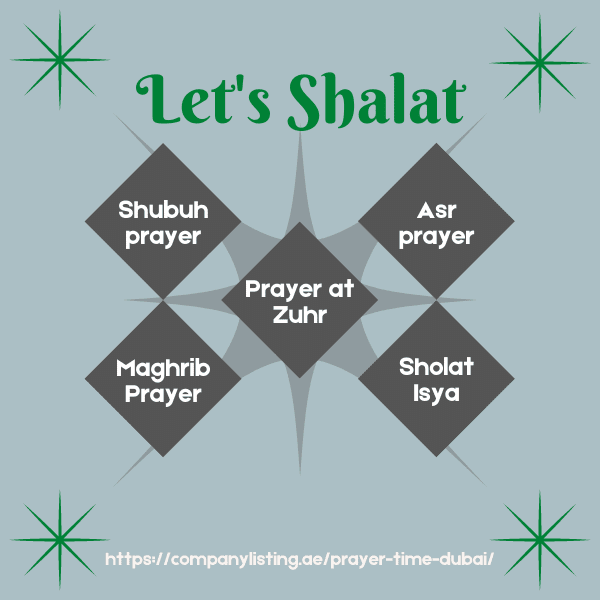Muslim Prayer Time Dubai
Muslim Prayer Time Dubai
Muslim Prayer Time Dubai - If Muslims ask for prayers to God it's not simply a worshipful act. It's believed to be an act of purification to the spirit. It is a mental, physical, and spiritual opportunity to communicate with God.
Today, more than a billion Muslims around the world pray five times per day. In the morning, at noon and afternoon, after sunset and at the night. Praying has to be done while facing toward the Kaaba during the night in Mecca. You are usually required to stand, bend and prostrate before God and recite the Quran.
Prayer is an essential pillar of Islamic religion. It allows you to recall and thank God for the blessings God has granted you. Health, a home or family member, friends food, and a comfortable life.
To many Muslims praying is believed to be an act of food. In the same way, our body requires nutrition several times throughout the day to remain active and healthy. Muslims practice prayer to provide spiritual nourishment.
Before they pray, Muslims have to physically purify with water. They clean their hands, arms facial, faces, and parts of their body. This also acts as a way of washing your sins out. It is recommended to wash your mouth whenever it was something you shouldn't havesaid, you wash your eyes when you see something that you shouldn't Your feet are cleaned if you've gone to a place that you shouldn't , and all the way to.
The prayer is comprised of 'cycles' referred to as rakaat. Prayers in the morning for example, are the shortest ones having only two rakaat. the sunset prayers are comprised up of three rakaat, when the noon, after-hours and evening prayers consist out of 4 rakaat. Each prayer cycle consists of specific prayers and movements.
Prayer is one of the primary practice of a Muslim's daily life and is one of the most essential aspects. While we fast just one month in the year it is the time to give Zakah each year, Hajj is only required at the end of each lifetime, but praying is a routine act that needs to be carried out five times every day.
It brings discipline and discipline to the day and also acts as the best form of meditation for the busy life that we lead.
Muslim prayers: Salah dates, Adhan and rakat
SalahSalah is a word that means 'prayer' or'supplication'. often referred to as Namaz in non-Arab Muslim. Salah can be considered to be one of five foundations of Islam, which form the basis for the rituals and beliefs of this religion. The five pillars include:
-
Confessing of the faith (Shahada). The only God apart from Allah and the The Prophet Muhammad (PBUH) can be described as God's messenger. God.
-
Prayer (Salah)
-
Charity (Zakat)
-
Fasting (Sawm)
-
Pilgrimage (Haj)
Salah is mandatory for all adult Muslims and the prayer times can be set according to how the sun moves Sun and is performed five each day:
-
Fajr: Dawn, just before sunrise
-
Dhuhr midday: the moment when the Sun gets to its highest point.
-
Asr: The last part of the afternoon
-
Maghrib just after sunset
-
Isha Between sunset to midnight
praying in the masjid
Muslims are able to pray wherever. However they are not the only ones. Muslims can pray in the congregation of the masjid. A masjid is a site to worship for Muslims. In a group, praying together assists Muslims recognize that everyone is one , and all are equally before God.
Jumuah
In addition to the daily five prayers there is an official Friday (Jumuah) worship. The prayer is usually offered in the congregation, with a sermon on Fridays, in place or the noon prayers.
Adhan A call to prayer
The call for prayer that is made to the public is called Adhan. The Adhan is delivered from the masjid by a muezzin, who is designated as the masjid's prayer-caller. When a prayer is called muezzin recites the following Takbir (glorification for God) "Allahu akbar" which means "Allah is magnificent".
The entire prayer request is as follows:
Allahu Akbar (God is great)
Ashhadu an la Ilaha illallah (I beg to declare that there isn't a God except the God of the One God)
Ashadu Anna Muhammadar Rasool Allah (I bear witness that Muhammad is the messenger of God)
Hayya' an-s-Salah (Hurry up to pray, or stand up to pray)
Hayya"ala-l Falah (Hurry to succeed, or rise up to find salvation)
Assalatu khairum-minan-naum (Prayer is more effective than sleeping. This is only recited for praying in the early hours of the day.)
Allahu Akbar (God is Great)
La Ilaha al-Allah (There can be no God except the God who is the only God)
What's the meaning of Adhan?
The Adhan is said five times during the day, to invite Muslims to observe the obligatory prayer. It is normal to hear the prayer in public areas in countries with a substantial Muslim religious population. The Adhan is generally read from the minarets of Masjids. It is generally recited facing towards The Holy Kaaba in Makkah.
Performing wudu before salah
Wudu is an ablution act of washing your body prior to praying or reciting prayers or the recitation of Holy Quran.
For a step-bystep guide on performing wudu, go to this site.
Rakats in Salah
The term "rakat" refers to the recommended movements and the recitation of verses of the Holy Quran practiced by Muslims when they pray to Allah. It also refers to an entire piece comprising Islamic prayers.
Fajr
Fajr salah must be performed at the end of the night before sunrise. Fajr salah is made up of two obligatory and obligatory rakats. This is known as Fard.
Dhuhr
Dhuhr salah comes as the second prayer of the day that is said at noon. This prayer comprises four obligatory rakats.
Asr
Asar salah is performed in the afternoon following that of the Dhuhr prayer. The prayer consists of four obligatory rakats.
Maghrib
Maghrib salahs should be offered at sunset. Magrib salah comprises three mandatory rakats.
Isha
The fifth day's prayer has to be Isha salah. It includes four obligatory rakats.
There are many other prayers along with these five obligatory prayers:
Jumuah prayer (offered to Fridays every day at noon).
Tahjjud praying (offered around the early hours of the morning. However, it's not obligatory).
Tarawih prayer (offered alongside the Isha prayer and occurs in it's holy month Ramadan).
Eid prayer (offered during Eid Al Fitr and Eid Al Adha).
The advantages of various salah positions:
There are a variety of positions one can take while making salah. Some of them include Qiyam, Ruku, Sajdah and Tashshhud. There are many benefits of these actions , including:
-
Qiyam (standing) Qiyam (standing) ensures the proper flow of blood to the lower part of the body. It helps strengthen the leg muscles.
-
Ruku (bowing) The posture is great as it helps lower the spinal column. It reduces back pain. It involves stretching wrists, elbows, knees and ankles. It helps build flexibility in all of these parts of the body.
-
Sajdah (prostration) A form of low bowing or prostration towards God toward the qiblah. Sajdah maintains blood flow to the brain and stimulates the pituitary gland along with the pineal gland.
-
Tashahhud (sitting position) The posture is similar to the Vajrasana as a key Yoga position. The position is said to improve the strength of the calf and the thigh muscles, improve digestion, as well as keep the spine straight and straight.
.png)

.png)

Comments
Post a Comment